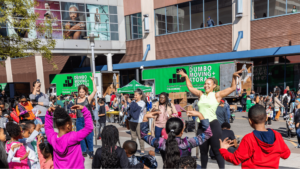As an event creator, you know more than anyone that putting on events requires significant investment, both in time and in money. Venues aren’t typically free, and the same can be said for speakers, presenters, support staff, audio systems, video systems, and the list can go on. Sponsorship can lend a certain air of respectability — evidence that the sponsoring business, which can often be a bigger name in the community than the event creator or presenters, supports the event. Fortunately, you can learn how to get local businesses to sponsor your event, and Eventbrite makes it easy.
When your event is hosted on Eventbrite, sponsors can easily access your event details and see how professional your event will be. It’s a chance to show your potential sponsors that their name, too, could be listed on the event page as a sponsor and featured on a website accessed by millions of users. And tools like Eventbrite Boost enable wide-reaching marketing and promotions efforts across a variety of social media platforms and elsewhere. All these tools can be used to help convince your potential sponsor of the benefits they could see.
There are typically two ways local companies will support events. There is outright financial backing, in which they provide funds to pay for some portion of your event. Alternatively, they might make a donation of some kind to your event — maybe it’s a restaurant that will donate appetizers or pastries, or a local camera store donating the use of video cameras. It all depends on the nature of the business and of your event.
Let’s run through some more event sponsorship tips.
How to get local sponsors
Asking local businesses to sponsor your event can seem challenging at first. You might have doubts about companies’ willingness to “give money away.” But companies that are involved in your community are no strangers to supporting local interests. From Little League teams to church food drives, businesses are often quite willing to invest in their communities.
And it’s important to remember that you are bringing something to the table as well. Your event should draw a crowd, and attendees will be exposed to and reminded of your sponsor’s business. That can bring significant value to the business, too. Here are some tips for requesting sponsorship in your community:
1. Frame your game. Getting sponsorship is in some ways a sales job, and in sales, it’s all about framing. Your pitch should be focused on how your event is an opportunity for the business to get exposure for their brand. It helps if you can cite attendance numbers at prior events or other data that can indicate to the business owner how many people will be exposed to the business’s brand. This can be especially effective for food and drink vendors and businesses who would like to entice more people to try their products.
2. Focus on community. Remember, the business you are approaching is a local business. Many companies that sponsor local events do so because they know that it’s the locals who support them. Keep your pitch locally focused, and draw the business in by highlighting your shared goal of benefiting the community. Your case will be made stronger, of course, if you can provide data showing past community support. Maybe it’s something you have done individually or some way your events have supported the community. Do you donate a portion of proceeds to a local food bank or Boy Scouts chapter? The more you can prove, the stronger your case will be, and the more willing the business will be to join in.
3. Review your sponsorship levels. When you’re approaching a local business to make an event sponsorship proposal, it’s also important to be realistic about what level of support they will be able to provide. A local business will not have the same budget for sponsorship that a larger corporation will have, and if your ask is too unrealistic, you are liable to scare off any potential sponsors. Be clear, too, about what you need from them, whether it’s simply funding or material support in the form of supplies or equipment. A failure to be clear can lead to misunderstandings and bad feelings, so it’s essential you are all on the same page.
4. Exclusivity Rules. Entice your potential sponsor with exclusivity and get their interest piqued. A sole sponsorship is more intriguing as it ensures there will be no competitors crowding out the vendor’s name on banners, promotional materials, or merchandise. That gives the vendor better bang for their buck, and that will often prove more interesting than being only one name among many others.
5. You scratch my back. Make sure to offer special access and benefits at your event for the sponsoring business. Provide VIP access and make them feel like a big-shot, and you’re much more likely to get repeat business in the future. Hang a prominent ad banner in a noticeable location, or offer special discount codes to the sponsor for merchandise, food, or other features.
How to ask for donations from local businesses
Another way to gain sponsorship support for your event is to request donations. For many businesses, this can be an easier and more manageable way to support the community than outright financial backing. Sponsored charity events can work well here. If your event is a charity fundraiser, donating items might be a way to lose excess inventory while gaining tax benefits that make up for the loss.
When seeking donation sponsorship for your event, consider approaching businesses involved in:
- Food and drinks: Restaurants and caterers are sure you’ll fall in love with their specialty if you’ll only try it. Donating food to an event is a great way to get a lot of people to try new foods.
- Tables and chairs: Often schools, churches, or other community groups may stock chairs and tables for when they need them. See if you can borrow them and offer sponsorship benefits.
- Sound equipment: Check the local audio/visual store about donating older or excess sound equipment in exchange for advertising banners or other free promotional materials. You can add the store’s name to your Eventbrite event page for more exposure.
- Space: You might even approach a venue about donating their space for your event. Maybe it’s a restaurant with a private room or a hotel with a spare conference room.
See a sample letter to local business for donations
Now that you’ve zeroed in on those local businesses that seem like perfect matches for your event, you’ll want to reach out to them to see if there is mutual interest. Depending on your personal style and availability, this initial contact can generally be made in one of three ways. You might visit the business in person, introduce yourself to the owner, and make your pitch then and there. Before you do, make sure you know exactly what you want from the business, so there is no confusion or misunderstanding later.
By showing up in person, you can make a personal connection more easily, and it suggests a level of interest that an email can’t match. But it also requires a degree of confidence to pull off; and a dash of charm and relatability won’t hurt, either. Without the right touch, a business owner might be put off by what can perhaps come across as a hard sell technique.
Alternatively, you can make a personal connection by phone call; simply call and speak to the owner. While the benefit of eye contact is lost, this can be a more convenient option for both you and the business owner.
Your third option is to send a letter to the local business owner. While you lose the immediacy of connection you get with a phone call or in-person visit, a letter can seem more respectful of the owner’s time by letting them review your request at their leisure. You’ll want to be sure to include certain essential details so that the owner can make a fair assessment of your event.
No matter how you contact them, don’t forget to tell the owner:
- About your event — what kind of event it is, who is presenting, and what the topics are;
- When your event is scheduled — businesses often time their marketing efforts to coincide with certain seasons or holidays;
- Where your event is taking place — is it a neighborhood that’s close to their business?
- Whom you expect to attend — are your audience members people the business wants to attract?
- What you want from the business owner — a donation? Financial support?
- What you can offer the business owner — they’ll want something for their support. On-site banners and promotional materials?
As an example, your letter might look something like this:
November 1, 2022
Gretel Sugarlove, Owner
Black Forest Dessert Shoppe
123 Buttercream Way
Cherryville USA
Dear Ms. Sugarlove:
I hope you’re well. I’m writing to you because I’m organizing a cooking class at the Pots & Pans Kitchen Supply Co. store located down the street from you at 133 Buttercream Way. The class will be held on December 4th and will be focused on recipes for classics of German cuisine, such as sauerbraten. I thought some treats from your kitchen would make a wonderful dessert.
In my past cooking classes, I’ve generally attracted a young professional crowd as well as some retirees learning new hobbies. My attendance has grown recently, prompting me to add a second monthly class, and generally runs anywhere between 10 – 20 people at each class.
Would you be willing to make a donation of desserts for this event in exchange for including your store’s name on our marketing materials as a sponsor? It can introduce your products to a desirable demographic, so the exchange can be mutually beneficial. We’d also love to offer you and a guest free tickets to the class if you’re interested.
If this interests you, please contact me at (XXX) XXX-XXXX. In any event, I hope you won’t mind if I follow up on this letter with a phone call in the next few days.
Thank you for your consideration.
Sincerely,
Hansel Sausagemaker
Now that you know how to get local sponsors, it’s time to get started
Okay, so you’ve made a list of local businesses whose brands would complement your event, who seem invested in their community, and who have products or features that would help you make a better event. You’ve put top-of-mind the ways your event can benefit their business as well, and you’ve made sure to review your sponsorship levels to make sure your asks are realistic and achievable. It’s time to start making your approaches.
Fortunately, with the tools Eventbrite puts at your disposal, your approach is not made alone. Along with essential tools, Eventbrite features a wide variety of content about sponsorships, so you can be as ready as possible.
The rest is up to you.






